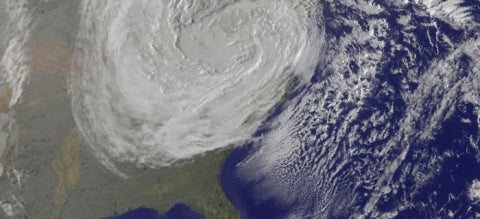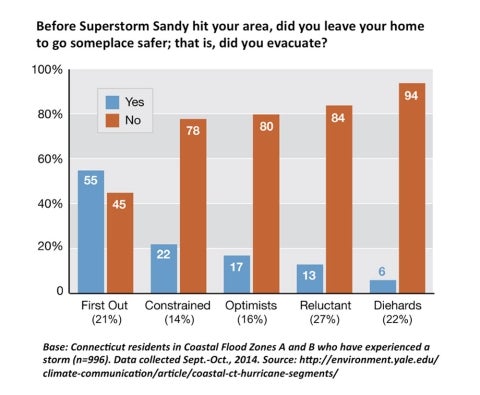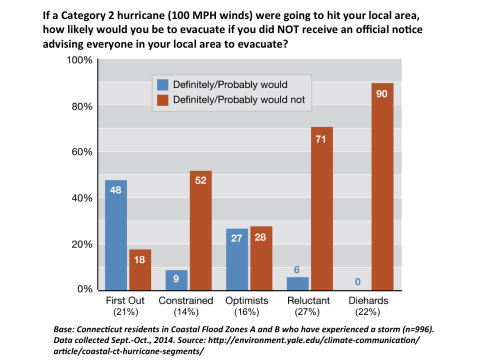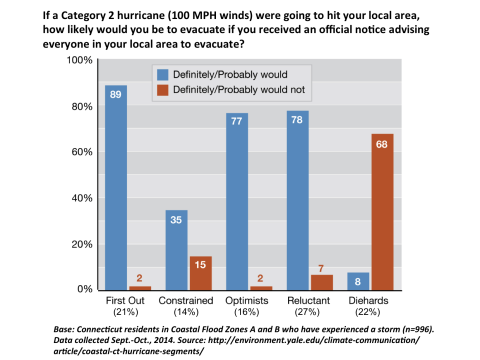Note: Yale School of the Environment (YSE) was formerly known as the Yale School of Forestry & Environmental Studies (F&ES). News articles and events posted prior to July 1, 2020 refer to the School's name at that time.

As Superstorm Sandy battered the U.S. East Coast in 2012, residents in communities along the Connecticut shore received “mandatory” evacuation orders, but most people didn’t leave. A new Yale report, based on a survey of 1,130 people living along the state’s coastline, provides insights into why some people decide to evacuate in the face of a weather emergency and why others try to ride out the storm.
The study, conducted by the Yale Project on Climate Change Communication (YPCCC), identifies five different types of people based on how they respond to hurricanes. They are:
“Each of these audiences need a tailored communication strategy to help them prepare for or evacuate before a hurricane hits,” said Anthony Leiserowitz, director of the YPCCC and co-investigator of the study.
The “Diehards” and “Reluctant” — which account for about half of respondents (49 percent) — say they would either refuse to leave their homes or would only do so if officially ordered to evacuate during a Category 2 hurricane (a storm in which wind speeds exceed 96 miles per hour).
And the “Optimists” do not believe that a hurricane will occur in the future, even though the region was battered by two major storms, Hurricane Irene and Superstorm Sandy, in the past five years.
The study, conducted by the Yale Project on Climate Change Communication (YPCCC), identifies five different types of people based on how they respond to hurricanes. They are:
- The First Out (21 percent) will evacuate for any hurricane.
- The Constrained (14 percent) would like to evacuate, but face barriers to leaving.
- The Optimists (16 percent) are doubtful that a hurricane will ever hit them, but will evacuate if needed.
- The Reluctant (27 percent) will leave only if ordered to.
- The Diehards (22 percent) are confident they can ride out the storm and won’t evacuate.
“Each of these audiences need a tailored communication strategy to help them prepare for or evacuate before a hurricane hits,” said Anthony Leiserowitz, director of the YPCCC and co-investigator of the study.
The “Diehards” and “Reluctant” — which account for about half of respondents (49 percent) — say they would either refuse to leave their homes or would only do so if officially ordered to evacuate during a Category 2 hurricane (a storm in which wind speeds exceed 96 miles per hour).
And the “Optimists” do not believe that a hurricane will occur in the future, even though the region was battered by two major storms, Hurricane Irene and Superstorm Sandy, in the past five years.
Survey: Did You Evacuate Your Home
Before Superstorm Sandy?
 <a href="http://environment.yale.edu/climate-communication/article/coastal-ct-hurricane-segments">Read the full report</a>
<a href="http://environment.yale.edu/climate-communication/article/coastal-ct-hurricane-segments">Read the full report</a>
”This study shows that different groups of coastal residents have very different needs relating to hurricane communication,” said Jennifer Marlon, an associate research scientist with YPCCC and lead investigator of the project. “Some plan on leaving for any hurricane and just want to know when and where they should go, while others want to know whether or not they should leave at all. And still others are convinced that they should stay, and so need to be convinced that it's safer to leave in some cases.”
Respondents who say they would be unwilling to evacuate are often driven by the impulse to protect their property; many express concern that leaving their homes during a weather emergency will leave their property vulnerable to looting or more severe damage. People in these groups also tend to be better prepared, with generators and pre-packaged food on hand.
Many who say they would leave immediately do not want to get stuck in their homes. They also tend to be concerned about putting rescuers at risk.
Four of the five groups are much more likely to leave their homes if local officials — particularly police or fire officials — tell them to do so.
"The most effective way to get people to evacuate is to have local police or firefighters call or knock on the door,” Marlon said. “Most people say they would then leave, with the exception of the Diehards.”
The report is based on data from a representative survey that was described in an earlier report, “Hurricane Perceptions of Coastal Connecticut Residents,” which was published in March.
The research was funded by NOAA’s Sea Grant Coastal Storm Awareness Program, which aims to improve public awareness and understanding during hazardous coastal events. The program is administered by the Sea Grant programs in Connecticut, New Jersey and New York.
“This report for our NOAA Sea Grant Coastal Storm Awareness Program will help emergency responders understand the very different levels of understanding and advance preparation that Connecticut citizens have, which will greatly facilitate safe evacuations in the event of an extreme storm or flood” said Nancy Balcom, Connecticut Sea Grant’s associate director at the University of Connecticut.
Respondents who say they would be unwilling to evacuate are often driven by the impulse to protect their property; many express concern that leaving their homes during a weather emergency will leave their property vulnerable to looting or more severe damage. People in these groups also tend to be better prepared, with generators and pre-packaged food on hand.
Many who say they would leave immediately do not want to get stuck in their homes. They also tend to be concerned about putting rescuers at risk.
Four of the five groups are much more likely to leave their homes if local officials — particularly police or fire officials — tell them to do so.
"The most effective way to get people to evacuate is to have local police or firefighters call or knock on the door,” Marlon said. “Most people say they would then leave, with the exception of the Diehards.”
The report is based on data from a representative survey that was described in an earlier report, “Hurricane Perceptions of Coastal Connecticut Residents,” which was published in March.
The research was funded by NOAA’s Sea Grant Coastal Storm Awareness Program, which aims to improve public awareness and understanding during hazardous coastal events. The program is administered by the Sea Grant programs in Connecticut, New Jersey and New York.
“This report for our NOAA Sea Grant Coastal Storm Awareness Program will help emergency responders understand the very different levels of understanding and advance preparation that Connecticut citizens have, which will greatly facilitate safe evacuations in the event of an extreme storm or flood” said Nancy Balcom, Connecticut Sea Grant’s associate director at the University of Connecticut.


– Kevin Dennehy kevin.dennehy@yale.edu 203 436-4842
Published
June 29, 2015